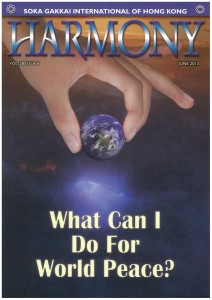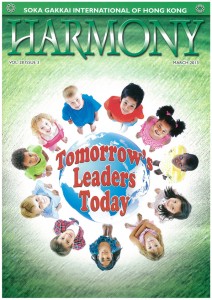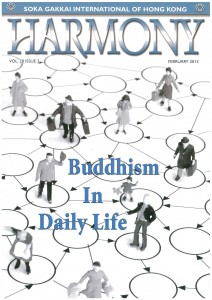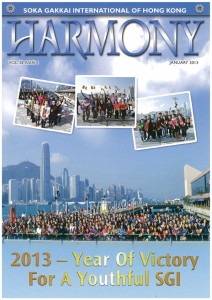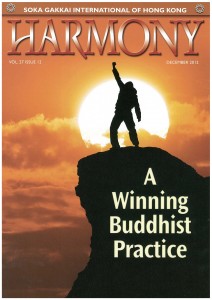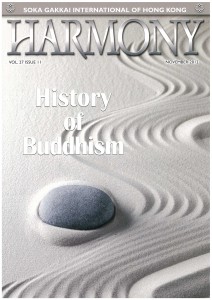HARMONY - June 2013
Thu, 13th Jun 2013
Category : Harmony, News (All), Publication
Thank you for reading this month’s harmony magazine. We have come a long way since our first issue on May 3, 1986, which started as a six-page photocopied newsletter. I would like to take this opportunity to thank all of the people who over the years have helped to make Harmony what it is today.
To serve our readers better, we have expanded to 48 pages and made a few changes and additions to the regular features. We have included a basic introduction and explanation of Nichiren Buddhism and the SGI to assist you when sharing this Buddhism and the benefits of chanting Nam-myoho-renge-kyo with your family and friends.
Also, we are delighted to feature a new cartoon series titled “Great Buddhist Stories”, courtesy of SGI-USA. They are illustrated by Rob Koo, SGI member and lead storyboard artist at an award-winning animation studio.
In this issue, we look at how each one of us can contribute to world peace.
When I did an Internet search on the phrase “what is world peace?”, it generated 867,000,000 results. No wonder it is easy to feel overwhelmed and disconnected.
Sometimes when we hear people talk about world peace, it just doesn’t resonate. Maybe we feel powerless to do anything about it; it is something out of our control. World peace can mean different things to different people, depending on who you are or whom you are taking to.
There are many aspects that contribute to world peace. Basic human rights, economic and political stability, environmental concerns, personal safety, the ability to navigate life’s challenges, all these are components of world peace.
The desire for peace is a common thread in most world religions, and in Hong Kong, the Interfaith Community holds an annual Day of Peace. The purpose is to share among the various religious traditions what peace means, and how each respective faith goes about contributing to that cause.
One would think that as the world gets “smaller” due to the advancements of technology, more and more people would realize the commonality of their neighbors on the other side of the planet. Hopefully, this increase in awareness will help cure some of the ills of the world. But ultimately, world peace starts with us, not someone else. It is up to us to decide how we can contribute in our own way. As is mentioned in this month’s Special Feature and our Viewpoints, world peace starts with each of us.
The Buddhism of Nichiren Daishonin allows us to start the process of peace from within to radiate outwards into our families, place of work and the community to create a peaceful and harmonious society.
We hope you enjoy this issue.
Skip Williams
Quote of the Month
“No matter what the state of society or the times, each of us can contribute to peace in our immediate environment. We can do this by encouraging even one young person and enabling them to tap into their potential.” (www.ikedaquotes.org)
HARMONY - May 2013
Mon, 6th May 2013
Category : Harmony, News (All), Publication
President Ikeda says: “When we pray and take action with the force of a charging lion to realize the ideals of a teacher of truth and justice, we can shine our brightest and demonstrate our greatest strength” (Daisaku Ikeda, April 2008 Diabyakurenge).
I was watching the movie The Wizard of Oz recently, and thought about the storyline and how it applies to our Buddhist principles.
The main characters, Dorothy, the Tin Man, the Scarecrow and the Lion, all were seeking something outside of themselves. They were in search of something they thought they lacked and needed to make them feel happy and complete.
Dorothy was looking for happiness somewhere over the rainbow (the external environment). The Tin Man was looking for someone to give him a heart (compassion). The Scarecrow wanted someone to give him a brain (wisdom) and the Lion wanted someone to infuse him with courage. Throughout their journey, they had to ward off the Wicked Witch of the West, which I viewed as fear and fundamental darkness.
They ventured on, encountering constant attacks from the Witch. It was easy to defeat her once they realized the method, just as we can overcome our fears by chanting Nam-myoho-renge-kyo.
Their goal was to get the Wizard (someone else) to give them the things they felt they lacked. He explained that what they sought he didn’t have to give, as they already possessed the qualities they were searching for. All that was needed was to look inside and bring those qualities out of their lives.
How many of us give in to our fears, our fundamental darkness, and think we lack compassion, wisdom, and courage? Yet, these are the qualities we can manifest when we chant.
When we are able to summon up our courage like the roar of a lion, nothing can stand in our way.
As President Ikeda has said: “Courage is free. Anyone can have it” (FIA, p.221)
Skip Williams
Quota of the Month
“You should not have the slightest fear in your heart. It is lack of courage that prevents one from attaining Buddhabood” (WND1, p.637)
HARMONY - April 2013
Mon, 8th Apr 2013
Category : Harmony, News (All)
The Daishonin writes: “A mind now clouded by the illusions of the innate darkness of life is like a tarnished mirror, but when polished, it is sure to become like a clear mirror, reflecting the essential nature of phenomena and the true aspect of reality. Arouse deep faith, and diligently polish your mirror day and night. How should you polish it? Only by chanting Nam-myoho-renge-kyo” (WND1, p.4).
When we hit a deadlock, when we give in to doubt, when we feel we are unable to win… that’s the time that we should summon great courage and realize that we have the Buddha nature, we have the ability to win. It is up to us to make it so.
Self-pity, regrets, and complaints are manifestations of our fundamental darkness and a low life-condition. Succumbing to this inner negativity can only lead to stagnation in faith. With this weak mindset, we will go nowhere. Rebooting gives us a fresh perspective on our practice so we can become victorious.
Quote of the Month
Faith is another name for demonstrating unparalleled courage, the courage to persevere. Faith is reflected in the ability to take action in the face of obstacles. Courage is the ability to take action in the face of our fears. We all have obstacles and fears, so it follows that we also have the ability to demonstrate faith and courage by taking action.
In Buddhism, we learn that everything is interconnected. So, if we want to change the situation, we have to change ourselves first.
Happiness is not found in the absence of problems, although when in the midst of major challenges we may imagine that a problem-free life will bring happiness. The reality is that we all have to face many problems in our daily life, and the secret to happiness is found in facing the situation courageously. Rather than just cope with it, we must challenge ourselves to overcome the problem and move forward step by step. We can then find the strength to win and create an outcome that is best for us and for everyone concerned.
To effectively reboot our faith at crucial times, we need to have an in-depth understanding of this Buddhism and our life. This comprehension develops and deepens through study. Reading the writings of Nichiren Daishonin and the guidance’s of President Ikeda is key to developing a better understanding of this Buddhism and our life.
Quote of the month
“The Gohonzon is neither outside of us, nor in some specific place. It is found within faith. Without faith, we cannot bring forth the life state of Buddhahood. The Gohonzon exists in the lives of all who believe in the Mystic Law, chant daimoku, and work for kosen-rufu; it encompasses all of the treasures of the universe.” (Guidance Today Volume 5, p.294)
HARMONY - March 2013
Fri, 1st Mar 2013
Category : Harmony, News (All)
This month we look at tomorrow’s Leader Today.
What does it mean to be a leader in today’s world and what does it mean to be a leader for the future? does a leader have to be smarter, richer and more powerful than others? Is leadership a position of authority where you can order people around, control them, have them do your bidding?
The word ‘leader’ has many different meanings. It can be interpreted as the head of a company or organization, like a president, chief, or boss. It can also be used to describe a pioneer, an innovator or front-runner. Whichever your interpretation of leadership is, one thing is clear:for our society to grow and evolve, it is crucial that the new generation, those younger than us, develop further than us, in all possible ways.
The world is rapidly changing and daily life is becoming increasingly challenging and complex. Future leaders must be capable of taking the most appropriate action for victory, but must have the wisdom to do so for the greater good, not at the expense of others. To develop such insight and act in an ethical, fair manner will become even more important as time goes on. Developing the ability and capacity to do so will be vital for any good leader.
So the question becomes: how do we, as individuals, an organization or a society, prepare ourselves and others, to live and develop in the most value-creating way possible? What are some of the key traits that should be developed to become the best person possible for the future?
Having a sound life-philosophy is the essential foundation for this development. It must be a philosophy that recognizes and treasures the true value of each individual and allows everyone, not just a select few, to develop, cultivate and manifest their full potential.
Another key ingredient for developing great leadership skills is choosing a great mentor in life. One with whom we have a shared interest and commitment for the happiness of all as the cornerstone.
We are fortunate that in the Soka Gakkai we have such a mentor in President Ikeda and the previous presidents of the Soka Gakkai. We embrace a philosophy that allows us to manifest our greater self through a sincere Buddhist Practice.
We hope that you enjoy this issue of Harmnoy and find it helpful to identify how we can raise tomorrow’s leaders today.
Skip Williams
Quote of the month
“When you think, ‘I can’t do anymore. I need a break,’ that is the time to challenge yourself to keep going another five minutes. Those who persevere for even an extra five minutes will win in life.”
www.ikedaquotes.org
Available at all HKSGI Culture Centres
HARMONY - February 2013
Tue, 5th Feb 2013
Category : Harmony, News (All), Publication
This month we look at Buddhism and daily life. It is quite common for people to think of religion, or spirituality, as something independent from their other activities; that there is no correlation between them.
We have many responsibilities in our lives, things we want to achieve, family and work duties to attend to. The demands on our time can seem never- ending, and prioritizing what is really important becomes critical.
If we do not understand the Buddhist principles of the “interconnectedness of all things”, then we can all too easily fall into the trap of “slotting in” our Buddhist practice. It becomes just one of many activities that we need to take care of, get off our plate and move on.
We must be careful not to adopt this attitude. Our chanting should not be low on our list of daily activities. If we do so, we are cheating ourselves of the full benefit of our practice. We should not feel that there is a separation between our spiritual side and our secular activities. After all, our Buddhahood is always with us.
The practice of Nichiren Daishonin’s Buddhism is not one that is removed from the realities of the world; from our daily challenges, our hopes and dreams. We don’t go to some distant place because we want to change our life-state; we can do that on a daily basis, in the comfort of our own home, when we chant.
“Buddhism lies close at hand, in the here and now. It is found in daily life, is innate in human existence and in society. To present Buddhism as belonging to some far-off realm, removed from life and reality, is deceptive.”*
The challenge is to apply our Buddhist principles in our lives on a consistent basis. When we can do that, when we truly realize there no separation between the two, the direct result is that we will lead fuller and more enriched lives, no matter what the circumstances.
“The human being is at the center of Buddhism. With its focus on the importance of the heart and the preciousness of life, Buddhism exists to enable all people to cultivate their innate Buddhahood and manifest it within their lives.”*
We hope that this issue of Harmony will help you realize that Buddhism is daily life.
Skip Williams
Quote of the month
“Whilst human society highlights the “distinctions” or “differences” between us, Buddhism transcends all superficial differences and, in recognizing the commonality that all people share as human beings, focuses directly on life.”
www.ikedaquotes.org
Available at all HKSGI Culture Centres
HARMONY - January 2013
Mon, 31st Dec 2012
Category : Culture, Daisaku Ikeda, Harmony, LMSB, New Century Monthly, News (All), Peace, Publication
Happy New Year and happy Year Of Victory For A Youthful SGI!
The Harmony team would like to thank you for all your support in 2012 and we look forward to helping you deepen your understanding of Nichiren Daishonin’s Buddhism in 2013.
This year’s theme is one that should be embraced by all members of the SGI, not just the youth division. A youthful SGI has nothing to do with age but everything to do with spirit; an attitude of optimism and hope, not pessimism and despair. One working tirelessly, not only for one’s own happiness, but also for the happiness of others. Fully embracing the spirit of the oneness of mentor and disciple is a key component to this youthfulness. If you want proof of this, just look at President Ikeda. I am sure that everyone would agree that he is the embodiment of victory and a youthful spirit.
The Fountain of Youth is a legendary spring that reputedly restores the youth of anyone who drinks of its waters. Tales of such a fountain have been recounted across the world for thousands of years. We, in the SGI, have access to such a fountain, anytime we want; it is our Buddhist practice. By chanting Nam-myoho-renge-kyo with a correct attitude, reading the works of Nichiren Daishonin, the encouragement of President Ikeda, and participating in SGI activities, we are able to tap this fountain of youth and lead fulfilling and happy lives..the Month
President Ikeda reminds us of the following:
“The real meaning of youth has nothing to do with physical age. In Buddhist terms, youth means to consistently maintain an open, flexible and tolerant mind.”
“Life loses its dynamism from the moment we lose the passion with which to live it. No matter what our age, we cannot afford to let the flame within our heart grow dim. We do not become unhappy because we grow old. We become unhappy only when we grow ever more unwilling to change as we age.”
“Youthfulness is not determined by age. It is determined by one’s life force. One who possesses hope is forever young. One who continually advances is forever beautiful.”
(http://www.ikedaquotes.org/youth-aging)
Let’s set big goals for 2013, chant to our hearts’ content and take courageous action to make our wildest dreams become reality.
Happy Year Of Victory For A Youthful SGI!
Skip Williams
Available at all HKSGI Culture Centres
HARMONY - December 2012
Wed, 28th Nov 2012
Category : Harmony, News (All), Publication
All of us possess the potential to lead a dynamic, value-creating, winning life that allows us to challenge and win over any situation, no matter what. A life that is full of compassion and a willingness to help others, one that is filled with joy and happiness.
By chanting Nam-myoho-renge-kyo, we tap into our Buddhahood, thus enabling us to manifest our courage, compassion and wisdom, and enabling us to build a life-state that allows us never to be defeated. With the solid foundation of a winning Buddhist practice, we surely will win in daily life.
Having the right attitude when we chant is important if we want to get the most out of our practice and develop and maintain such a vibrant life. When we chant, we shouldn’t let our negativity, our fundamental darkness, control our thoughts. We need to have the attitude that we will win, and we definitely will through faith in the Mystic Law.
“If you practice faith while doubting its effects, you will get results that are at best unsatisfactory. This is the reflection of your own weak faith on the mirror of the cosmos. On the other hand, when you stand up with strong confidence, you will accrue limitless blessings” (For Today and Tomorrow, Nov 21).
It is important that we chant with appreciation and gratitude for the opportunity to manifest our Buddhahood and change our karma through this Buddhism, and also for the untiring efforts of the three founding presidents of the Soka Gakkai.
Quote of the Month
Without their efforts and those of others, we wouldn’t have the opportunity to experience the wonders and the joy found in chanting Nam-myoho-renge-kyo.
Making a vow for kosen-rufu is another crucial key. Realizing that everything we do—all the activities, challenging ourselves and facing difficult situations brightly—are opportunities to change our karma a chance to grow, develop and do our human revolution, as we help others also awaken to the realities of their own lives. When we make a vow to dedicate our efforts to kosen-rufu, our lives really open up.
The determination to carry out our mission and the spirit of the oneness of mentor and disciple have great importance in a winning practice.
“Those who always have their mentor in their hearts as they face life’s struggles are strong. When we make our mentor’s spirit of resolute commitment to kosen-rufu our own, we can bring forth the same life-condition and reveal unlimited potential. No unity is more solid that the spiritual bond of mentor and disciple. And the power of unity is what changes history.”
As you will read, developing and maintaining a winning Buddhist practice is something that anyone can do and have. Let’s chant, plan and take action as we build a beautiful life.
Skip Williams
Quote of the month.
Our practice is the force for attaining absolute victory. There is not a single wall or obstacle that cannot be overcome through our faith!
Let’s make a fresh departure towards the highest pinnacle of life and of kosen-rufu, starting first of all with invincible daimoku!
(— TO MY FRIENDS – Thursday, November 15th, 2012)
Available at all HKSGI Culture Centres
HARMONY - November 2012
Tue, 30th Oct 2012
Category : Harmony, News (All), Publication
DEAR MEMBERS AND FRIENDS OF SGI,
There are many schools of Buddhism and all too often they are assumed to be just the same, and the differences go unnoticed.
Growing up in a Judeo-Christian culture in the U.S., my understanding of Buddhism was extremely limited. I had some preconceived notions that all Buddhists were monks who lived in monasteries, wore robes, shaved their heads, were passive, vegetarian and meditated for hours in dark, smoky incense-filled rooms with lots of candles and statues. Too much influence from movies and television shaped that image, I guess.
It wasn’t until I started practicing the Buddhism of Nichiren Daishonin with the Soka Gakkai that I began to perceive the differences of the various schools and how they evolved from Shakyamuni’s teaching and that of his followers. I came to understand that I can manifest my Buddhahood from within without changing who I am. We don’t need to remove ourselves from society, as we can achieve enlightenment just the way we are. In fact, our mission is right where we are.
It is important that we know the origins of Buddhism and what separates the different forms. We need to understand why we don’t worship a statue of a Buddha, or why we don’t look for help from external
Quote of the Month
deities, if we are to accurately explain that by chanting the phrase Nam-myoho-renge-kyo, we can lead truly happy lives.
As Aristotle said:
“If you would understand anything, observe its beginning and its development.”
With that in mind, this month we look at the history of Buddhism and how the various schools came about.
By following the Lotus Sutra, the highest of all of the original Buddha’s sutras, Nichiren Daishonin’s Buddhism, as practiced in the SGI, is in direct accord with the intent of Shakyamuni. And that is to help all mankind overcome the four sufferings of birth, aging, sickness and death, and to lead truly happy and victorious lives.
We hope that this issue of Harmony will help you understand the roots of Buddhism and the importance of the Lotus Sutra.
Skip Williams
Quote of the month.
“The Buddhist religion is a faith that continues flowing forward into the world, working ceaselessly for the salvation of all sentient beings everywhere.”
(Daisaku Ikeda - Buddhism, The First Millennium, p. xii)
Available at all HKSGI Culture Centres
HARMONY - October 2012
Mon, 8th Oct 2012
Category : Harmony, News (All), Publication
Special Feature: Confidence in Faith
DEAR MEMBERS AND FRIENDS OF SGI, This month we look at Confidence in Faith. Skip Williams Quote of the month “And yet, though one might point at the earth and miss it, though one might bind up the sky, though the tides might cease to ebb and flow and the sun rise in the west, it could never come about that the prayers of the practitioner of the Lotus Sutra would go unanswered.” (WND1, p.345) Available at all HKSGI Culture Centres Mon, 3rd Sep 2012 Special Feature: Soka Education DEAR MEMBERS AND FRIENDS OF SGI, This month we look at Soka education; what its history is, how it differs from other ways of teaching, and how it has impacted people’s lives. While we all agree that education is of paramount importance, there are many schools of thought as to what education should do, what its purpose is and how it should be conducted. The shaping of young minds will have a long lasting impact on the individual, family, society and the world at large. Laying a proper foundation is of utmost importance for the future, and it is vital to create a safe environment for all students to thrive. In a sense, the education system is the seedpod to foster capable future leaders for a lasting change in society, and it is therefore imperative that the next generation be properly educated. Unfortunately, we live in a world of quick fixes and immediate gratification that demands instant, quantifiable results. With enormous pressure on educators to produce students with excellent academic results, we can sometimes see the focus of the educational process to be on immediate grades instead of the overall well-being and creativity of the individual. If the emphasis is on nurturing the gifted students that make the school look good, the slower learners may be left by the wayside. Soka education, as originally propagated by Mr. Makiguchi in Japan, is not a mere injection of knowledge, but has at its foundation a humanistic process that nurtures wisdom and enables the individual’s potential to bloom to the fullest; education that fosters and allows the creativity and the full potential of each student to grow. According to Makiguchi, the ultimate goal for a child’s education is to enable them to choose a path that will lead to happiness in their adult life, one that will allow them to be a positive contributor to shape a society that values the same humanistic principles. “Life itself is a learning process, and learning as long as we live is the way to lead a fully human life. The true purpose of education is to develop human beings. It is the process of using knowledge as the sustenance to foster people who can demonstrate infinite creativity and self- reliance. Gaining knowledge is indispensable for guiding a changing society, but knowledge itself is not the same as creativity. Education must enable us to manifest our inner potential, and learning is just a catalyst for drawing that out” (NHR v.23, chap.2, p.4, Light of Learning). We hope you are inspired by this month’s Harmony. skip Williams Quote of the month “The starting point and essence of Soka (value-creating) education is the spirit to treasure each student’s individuality so that they can become happy and enjoy a glorious future. Education does not exist for the sake of the nation, for business, or for religion. The aim of Soka education is the happiness of oneself and others, as well as society as a whole, and peace for all humanity.”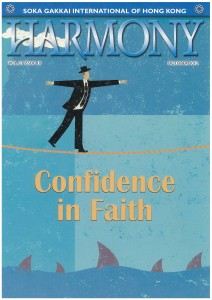
We all know confident people. They are sure of themselves and their decisions, and seem to have no obstacles in their path, sometimes they can even come across as arrogant. Yet many people admire them and strive to be like them, hopefully without the arrogance.
There are numerous seminars and books on how to develop confidence in many aspects of our lives; confidence in ourselves, work, relationships, family, with friends, quick decision-making, finance. These tips hold value in helping us feel better, but it may be all very superficial and crumble at the first signs of a real crisis.
Bu confidence in faith is something different.
Confidence in faith cannot be taught or given to you; there is no magic pill that you take and “poof’ you have it. It is something that you develop on your own, from deep within your life. It grows through the process of studying, chanting and experience. As we study, we come to understand the profundity of this Buddhism. As we chant Nam-myoho-renge-kyo, we experience first-hand the benefits of our practice, thus the benefits are serving as catalyst to deepen our faith.
It sounds easy to achieve – just study, chant and have great things happen! How could we not have confidence in the power of this Buddhism and the power of our lives?
However, as our practice deepens, our fundamental darkness will try to emerge and take hold. If we let it, all the positive results and confidence we have built-up will be eradicated. Succumbing to our inner darkness means we are planting doubts in ourselves and in the validity of our practice, thus preventing us from being absolutely happy.
Doubt is a powerful and elusive emotion. It can creep into our thoughts, our lives, without us even realizing it is there. It sometimes seems easier to criticize ourselves than praise ourselves, why is that? When we start thinking negatively about ourselves, or the situation, this is a sign that our fundamental darkness is hitching a ride. But we should not let this unwanted passenger sit next to us and negate our Buddha nature. If we do, our confidence in faith will start erode away.
Confidence in faith is embracing the realization that we have Buddhahood within. It is the absolute conviction that no matter what the obstacle, the situation, the circumstance, we can definitely change it. Through our chanting, manifesting our Buddhahood, changing our karma, we can be absolutely happy, and help others become happy as well.
We hope this issue of Harmony will assist you in strengthening your confidence in faith.HARMONY - September 2012
Category : Harmony, News (All)
(www.daisakuikeda.org)
Available at all HKSGI Culture Centres

